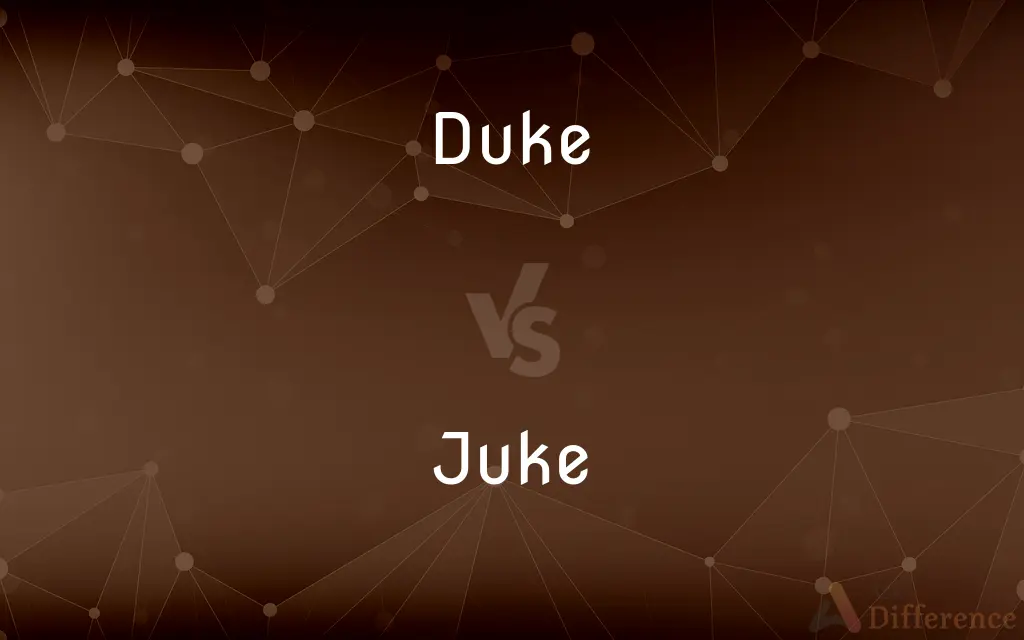Duke vs. Juke — What's the Difference?
Edited by Tayyaba Rehman — By Fiza Rafique — Updated on April 3, 2024
Duke is a title of nobility, while juke refers to a quick, deceptive move, especially in sports.

Difference Between Duke and Juke
Table of Contents
ADVERTISEMENT
Key Differences
Duke signifies a high rank in the nobility, often just below a monarch, denoting aristocracy and hereditary honor. Whereas juke is commonly used in sports and dancing to describe a swift maneuver intended to deceive an opponent or bypass an obstacle.
While the title of duke is associated with status, landownership, and historical privilege, often inherited through familial lines, a juke involves agility, strategy, and the element of surprise, showcasing an individual's skill in evading capture or making a strategic play.
Dukes have historically played significant roles in governance, military, and the social hierarchy, wielding influence over regions or domains. On the other hand, executing a juke is about momentary advantage and skillful evasion, critical in dynamic environments like football or basketball games.
The concept of a duke encompasses centuries of history, evolving roles in society, and a connection to the cultural and political fabric of a country. Conversely, the idea of juke is more fluid, often celebrated in the moment and admired for the immediate impact and cleverness it demonstrates.
While the responsibilities of a duke may include managing estates, participating in ceremonial duties, and sometimes engaging in political or charitable activities, the purpose of a juke is more straightforward – to outmaneuver an opponent, whether in a physical sport or a competitive situation requiring quick thinking.
ADVERTISEMENT
Comparison Chart
Definition
A noble rank below monarchs
A quick deceptive maneuver
Context
Aristocracy and governance
Sports and dancing
Key Attributes
Status, landownership, influence
Agility, strategy, surprise
Role in Society
Governance, military, social hierarchy
Momentary advantage, skillful evasion
Historical Significance
Centuries-old tradition
Fluid, celebrated in the moment
Compare with Definitions
Duke
A nobleman of the highest hereditary rank below princes and kings.
The Duke of Wellington played a pivotal role in British history.
Juke
To fake out an opponent with a sudden move.
She juked past the defender to score the winning goal.
Duke
Symbolizes historical significance and social hierarchy within nobility.
The duke's family had been prominent in politics for generations.
Juke
A quick, often deceptive movement to evade an opponent.
The player's juke left the defender scrambling.
Duke
Represents a level of authority and respect in aristocratic circles.
The duke's opinion was highly valued at the court.
Juke
Involves agility and cleverness, often in sports.
His ability to juke his opponents made him a valuable player.
Duke
In some countries, a sovereign prince ruling over a duchy.
The duke ruled his lands with a fair but firm hand.
Juke
A strategy to bypass obstacles or competitors.
She used a clever juke to outmaneuver her competition.
Duke
A title of nobility, often associated with specific duties and privileges.
Becoming a duke involves inheriting both the title and the responsibilities.
Juke
A maneuver in dancing to swiftly turn or shake.
His juke on the dance floor caught everyone's attention.
Duke
Duke is a male title either of a monarch ruling over a duchy, or of a member of royalty, or nobility. As rulers, dukes are ranked below emperors, kings, and grand dukes.
Juke
A roadside or rural establishment offering liquor, dancing, and often gambling and prostitution. Also called juke house, juke joint.
Duke
A nobleman with the highest hereditary rank, especially a man of the highest grade of the peerage in Great Britain.
Juke
A feint or fake.
Duke
A sovereign prince who rules an independent duchy in some European countries.
Juke
To play dance music, especially in a juke.
Duke
Used as the title for such a nobleman.
Juke
To dance, especially in a juke or to the music of a jukebox.
Duke
Dukes(Slang) The fists
Put up your dukes!.
Juke
To deceive or outmaneuver (a defending opponent) by a feint; fake.
Duke
(Botany) A type of cherry intermediate between a sweet and a sour cherry.
Juke
To deceive or outmaneuver a defender by a feint.
Duke
To fight, especially with fists
Duking it out.
Juke
(southern US) A roadside cafe or bar, especially one with dancing and sometimes prostitution.
Duke
The male ruler of a duchy (female equivalent: duchess).
Juke
A genre of electronic music native to Chicago, noted for its fast, abstract rhythms; see footwork.
Duke
The sovereign of a small state.
Juke
(sports) A feint.
Duke
A high title of nobility; the male holder of a dukedom.
Juke
The neck of a bird.
Duke
A grand duke.
Juke
To play dance music, or to dance, in a juke
Duke
Any of various nymphalid butterflies of the Asian genera Bassarona and Dophla.
Juke
To hit
Duke
A fist.
Put up your dukes!
Juke
To stab
Duke
To hit or beat with the fists.
Juke
(intransitive) To deceive or outmaneuver someone using a feint, especially in American football or soccer
Duke
To give cash to; to give a tip to.
I duked him twenty dollars.
Juke
(transitive) To deceive or outmaneuver, using a feint.
Duke
A leader; a chief; a prince.
Hannibal, duke of Carthage.
All were dukes once, who were "duces" - captains or leaders of their people.
Juke
(intransitive) To bend the neck; to bow or duck the head.
Duke
In some European countries, a sovereign prince, without the title of king.
Juke
(transitive) To manipulate deceptively.
Duke
The fists; as, put up your dukes.
Juke
To bend the neck; to bow or duck the head.
The money merchant was so proud of his trust that he went juking and tossing of his head.
Duke
To play the duke.
Lord Angelo dukes it well in his absence.
Juke
To perch on anything, as birds do.
Duke
To beat with the fists.
Juke
The neck of a bird.
Duke
A British peer of the highest rank
Juke
A small roadside establishment in the southeastern United States where you can eat and drink and dance to music provided by a jukebox
Duke
A nobleman (in various countries) of high rank
Juke
(football) a deceptive move made by a football player
Common Curiosities
How do Dukes influence society today?
While their political power has waned, many dukes engage in charitable, social, and cultural activities.
What sports commonly use the term "juke"?
Football, basketball, and soccer often reference juking to describe evasive maneuvers.
Are there female Dukes?
Female equivalents of Dukes are typically called Duchesses, either in their own right or through marriage.
Is juking only applicable to sports?
While commonly associated with sports, juking can also refer to quick, deceptive moves in dancing and other contexts.
Can a juke be planned or is it spontaneous?
Jukes can be both premeditated and spontaneous, depending on the situation and the skill of the player.
What is the significance of a juke in a game?
A successful juke can change the momentum of a game, providing an advantage or leading to scoring opportunities.
Can a juke be used defensively in sports?
Yes, juking can also be defensive, used to evade an opponent's offensive move.
Can the effectiveness of a juke be measured?
Effectiveness can be observed in the immediate outcome, like evading an opponent or contributing to a score.
Do all countries have Dukes?
Not all countries have Dukes; the title is specific to certain monarchies and their traditions.
What is the origin of the title "Duke"?
The title originates from Latin "dux," meaning leader, denoting a high rank in European nobility.
Can anyone become a Duke?
Traditionally, dukedoms are hereditary or bestowed by a monarch, not attainable by just anyone.
How are Dukes addressed?
Dukes are often addressed as "Your Grace" or "Duke [Name]," depending on the formality and context.
Is there a physical benefit to learning how to juke?
Learning to juke can improve agility, reflexes, and spatial awareness, beneficial in various physical activities.
What responsibilities come with being a Duke?
Responsibilities can include managing estates, participating in ceremonial roles, and various forms of public service.
Has the role of Dukes changed over time?
The role and influence of Dukes have evolved, with many transitioning from governing to more symbolic or philanthropic roles.
Share Your Discovery

Previous Comparison
Pleonasm vs. Tautology
Next Comparison
Lebanese vs. WogAuthor Spotlight
Written by
Fiza RafiqueFiza Rafique is a skilled content writer at AskDifference.com, where she meticulously refines and enhances written pieces. Drawing from her vast editorial expertise, Fiza ensures clarity, accuracy, and precision in every article. Passionate about language, she continually seeks to elevate the quality of content for readers worldwide.
Edited by
Tayyaba RehmanTayyaba Rehman is a distinguished writer, currently serving as a primary contributor to askdifference.com. As a researcher in semantics and etymology, Tayyaba's passion for the complexity of languages and their distinctions has found a perfect home on the platform. Tayyaba delves into the intricacies of language, distinguishing between commonly confused words and phrases, thereby providing clarity for readers worldwide.














































